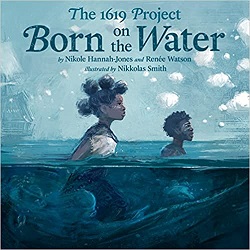
 The 1619 Project
The 1619 ProjectBorn on the Water
Review posted January 17, 2022.
Kokila (Penguin Random House), 2021. 44 pages.
Review written December 27, 2021, from a library book
Starred Review
2021 Sonderbooks Standout:
#3 Children's Nonfiction
This book, like Your Legacy (which is for even younger children), shows African American children that the history of their people didn't start with slavery. The book is presented as a series of poems. The story begins with a girl asked to do a school assignment, with a family tree and telling which country her family is from. She's upset that she can only go back three generations. Then her grandmother tells her about their people, who were born on the water.
And she begins the story in Africa. There are ten lovely pages telling about their ancestors in Africa. Some bits of that:
Their story does not begin
with whips and chains.
They spoke Kimbundu,
had their own words
for love
for friend
for family.
Their hands had a knowing.
They knew how to hold a baby close,
how to rock the child to keep her from crying.
But the white people took them away and kidnapped them.
Ours is no immigration story.
They did not get to pack bags stuffed
with cherished things, with the doll grandmama
had woven from tall grass,
with the baby blanket handed down
from generation to generation all the way back,
so far back that it carried the scent of the ancestors.
We're told about the White Lion, the first ship to bring slavery to America in 1619.
They had no things. But they had their minds.
The old ways, the harvest songs, the just-right mix of herbs
etched in their memories.They had their bodies. Histories and bloodlines
and drums pulsing in their veins.
With trembling fingers
they braided seeds into their hair, defiantly hiding
tiny pieces of home
to plant one day
in new soils.
Many died on that ship, almost half, whether from despair or defiance or sickness and hunger. But those who survived resolved to live no matter what. Here's the part that explains the title of the book:
Packed in dark misery,
strangers chained together
head to feet, hip to hip,
in the bottom of a ship
called the White Lion,
they saw that these strangers --
men, women, children, kidnapped, too,
from many villages --
these were their people now.These many people
became one people,
a new people.And that is why the people say,
We were born on the water.
We come from the people who refused to die.
The rest of the book talks about what those people born on the water accomplished, despite being enslaved. How they resisted, simply by living on. How they used their gifts and their intelligence to overcome and accomplish great things.
"Never forget you come from a people
of great strength," Grandma says.
"Be proud of our story, your story."
Let me add a note that I think it's terrible it will be controversial to get this book out in the schools where kids can read it. This book is not shaming white people. Yes, it tells the truth about what many white people did. But the point of the story is that Black children can rightly be proud in the hope and resilience and intelligence and resourcefulness of their ancestors. And it would be great for white children to also know about this heritage their classmates proudly bear.
The story of African Americans does not begin with slavery.
